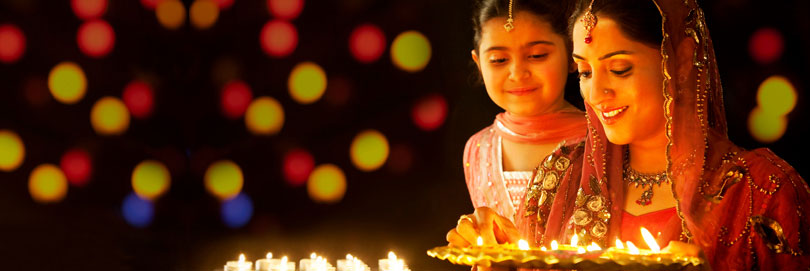Diwali in Orissa

| Diwali Celebration in Orissa | ||||||||||
|
"Bada badua ho, andhaara re aasa, aluwa re jaa. Baaisi pahaacha re gada gadau tha." "O forefathers, come to us in this dark evening, we light your way to heaven. May you attain salvation on the 22 steps of the Jagannath temple of Puri."
There's not much different about Diwali Festival Celebrations in Orissa. Rows of oil lamps, candles and lanterns adorn the thresholds of all houses. Crackers are burst, sweetmeals are relished and distributed. It could be akin to Diwali Festival anywhere else in India, save for one small ritual. It is a ritual that calls upon the spirits of the family's forefathers. Jute stems are burnt to light up the dark path that the spirits of the ancestors take back to heaven.
All the members of the household gather together just after dusk. A rangoli of a sailboat is made on the ground. The boat has seven chambers. Over the drawing of each different chamber several items are kept - cotton, mustard, salt, asparagus root, turmeric and a wild creeper. Over the central chamber are the offerings meant for prasad. Perched over the prasad is a jute stem with a cloth wick tied around the edge. It is lit at the beginning of the puja. All members of the family hold a bundle of jute stems in their hands. Lighting their respective bundles from the flame on the rangoli, they raise them skywards chanting:
"Bada badua ho,
andhaara re aasa,
aluwa re jaa.
Baaisi pahaacha re gada gadau tha."
Beside the rangoli, a mortar and pestle and a plough are also kept and worshiped. After the puja and offerings, the family celebrates Diwali festival by bursting crackers. As in other regions, most people prefer to celebrate it in their own homes, though family gatherings are also common. For Diwali houses are brightly lit, with the doors and windows kept open as Lakshmi is supposed to visit every home, and you can't afford to leave it dark and abandoned.
Assam | Bihar | Delhi | Gujarat | Jammu and Kashmir | Orissa | Rajasthan
Punjab | West Bengal | Uttar Pradesh | Himachal Pradesh
- - Diwali Cards
- - Crackers
- - Dry Fruits
Festival Fun
- Diwali Rangoli
- Diwali Whatsapp Messages/Status
- Diwali Recipes
- Deep in Diwali
- Tradition of Playing Cards
- Pooja Thali Decorations
- Making Diwali Cards
- Diwali Essay
- Diwali Poems
- Diwali Songs
- Diwali Mela
- Diwali Wallpapers
- Diwali Decorative Items
- Diwali 2024
- Diwali Messages
- Diwali Quotes
- Lakshmi Pooja
- Articles
- Lakshmi Ganesha Mantras
- Lakshmi Chalisa
- Diwali SMS
- Diwali Solar Eclipse
- Diwali Remedies
- 108 Lakshmi Names
Diwali Rangoli
Indians love colors and its perfectly reflected in various ways. Rangoli is one such example that is a unique art work that is...Know More
Diwali in History
The history of Diwali is replete with legends and these legends are moored to the stories of Hindu religious scriptures...Know More
Diwali Messages
Enjoy the Best and the Most Heartfelt Diwali Messages from all entries received by us!!...Know More
Diwali Gift Ideas
Diwali is the epiphany of showing gratefulness to the almighty for blessing with wealth and wisdom. It is the time of illuminating...Know More





